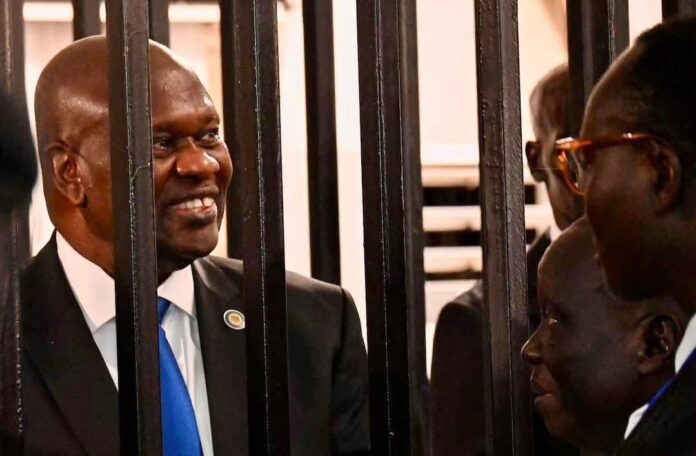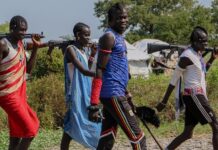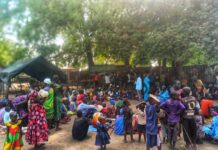Suspended First Vice President Dr. Riek Machar appeared in court today, Monday, for the opening session of his much-anticipated trial only for the public to learn that independent journalists had been barred from attending, sparking nationwide outrage and accusations of political censorship.
Both the defense and prosecution teams presented their arguments before a specially appointed panel of judges at Freedom Hall, where the proceedings are taking place under tight security. Following today’s presentations, the session was adjourned to Tuesday, 23 September, for further deliberations.
The lead defense lawyer for Dr. Riek Machar Teny, Advocate Dr. geri Reymond Legge, challenged the legality of the special court trying the suspended First Vice President, arguing that its formation violates the Revitalized Peace Agreement.
Kur stated that, under the agreement, the Supreme Court does not have the mandate to establish such a court, particularly to try high-ranking officials with constitutional immunity.
He further argued that Dr. Machar enjoys immunity as a First Vice President, and that only Parliament has the authority to remove such immunity through a proper parliamentary session, including a two-thirds majority vote to impeach a process which, he noted, has not taken place.
“This court was not established through legal means and undermines the peace agreement. Our clients cannot be prosecuted without Parliament first lifting their immunity,” said Advocate Kur.
However, the prosecution team dismissed these claims, asserting that criminal proceedings can be initiated against any public official, including the President, without the need for parliamentary approval, especially in cases involving serious allegations.
“No one is above the law,” a lead prosecutor argued. “Immunity does not mean impunity.”
Despite the high-stakes nature of the trial, Dr. Machar and his co-accused appeared calm and in good health, even smiling during the proceedings. All the accused are members of the opposition SPLM-IO party.
However, the day’s legal developments were overshadowed by a media blackout, as reporters from local and international outlets were denied access to the courtroom.
Only journalists from the state-run South Sudan Broadcasting Corporation (SSBC) were allowed inside under a last-minute directive that had not been publicly disclosed.
The exclusion of independent media has triggered swift and widespread condemnation from media rights groups, civil society organizations, and legal observers. The Union of Journalists of South Sudan (UJOSS) described the restriction as a “direct attack” on press freedom and a violation of the constitution.
“This is a shameful violation of Articles 24 and 32 of the Transitional Constitution,” UJOSS said in a statement. “Only state-controlled media were allowed in, while independent voices—those who represent the people—were locked out.”
Nyibang Tulba, Press Secretary in the Office of Justice, confirmed the directive came from the Ministry of Information, which allegedly required prior clearance for all journalists—a policy never previously communicated.
“We were told all media personnel must be cleared by the Ministry,” Tulba said. “But even I, as Press Secretary, was denied entry. This is deeply concerning.”
Dr. Machar and seven senior members of his SPLM-IO party are facing charges related to violence in Nasir earlier this year. His defense team has categorically denied all accusations, describing the case as politically driven and aimed at weakening the opposition.
“This trial is not just about justice it’s about power,” one legal observer noted. “And blocking journalists only confirms public suspicion of political interference.”
Edmond Yakani, Executive Director of the Community Empowerment for Progress Organization (CEPO), warned that restricting media access could have dangerous consequences for public trust and national stability.
With the trial adjourned to Tuesday, 23 September, legal teams are expected to continue their arguments, and more witnesses may be called. Meanwhile, pressure is mounting on the Ministry of Justice and the judiciary to reverse the media ban and allow full coverage of the proceedings.





